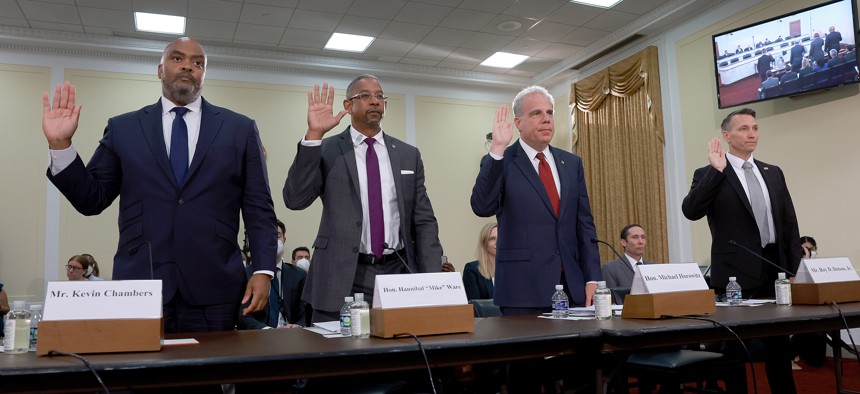
(Left to right): Kevin Chambers, director for COVID-19 Fraud Enforcement at the Department of Justice; Hannibal "Mike" Ware, inspector general for the Small Business Administration; Michael Horowitz, chair of the Pandemic Response Accountability Committee; and Roy D. Dotson Jr., national pandemic fraud recovery coordinator at the Secret Service are sworn in to testify during a hearing held by the House Select Subcommittee on the Coronavirus Crisis on June 14, 2022. Joe Raedle/Getty Images
COVID Oversight Officials Request More Time and Money to Ferret Out Fraud
Democrats allege more mismanagement of pandemic funds by the Trump administration.
Federal officials asked Congress for more money and more time to prosecute COVID-19 fraud during a hearing on Tuesday.
Oversight of pandemic programs has been a wide-ranging task conducted by the three entities created by the CARES Act, Justice Department, Government Accountability Office, inspectors general, Secret Service and others. The majority staff on the House Select Subcommittee on the Coronavirus Crisis published a memo ahead of its Tuesday hearing with numbers to date on the recovery of small business funds that had been received improperly, defendants charged and other figures, but oversight officials stressed that true tallies are not known yet.
The oversight community and law enforcement’s “efforts to fight fraud in small business loan programs would be enhanced by the extension of the statute of limitations for [Paycheck Protection Program and Economic Injury Disaster Loan program] loan fraud” in two bipartisan bills passed by the House last week, Michael Horowitz, the committee chair who also serves as the DOJ inspector general, said in his prepared remarks.
“The 10-year statute of limitations is consistent with that for bank fraud, which has been charged in most cases of alleged PPP fraud for loans issued by traditional banks,” he continued. “However, many loans in small business pandemic relief programs were issued by nonbank financial technology companies, or fintechs. Fraud cases involving fintech companies are prosecuted as wire fraud, which has a statute of limitations of five years.”
Kevin Chambers, director for COVID-19 Fraud Enforcement at Justice and Hannibal “Mike” Ware, inspector general for the Small Business Administration, also expressed their support for this legislation during the hearing.
As for funding, Chambers called for support for the $41.2 million for Justice’s COVID-19 fraud enforcement President Biden included in his fiscal 2023 budget request that was not approved in his fiscal 2022 proposal (he didn’t cite the current, enacted level). “These resources will speed our data analysis and our identification of fraudulent schemes and that will increase our ability to bring people to justice and recover funds,” he said.
Ware said the president is requesting a $10 million increase for fiscal 2023 over the current level and that it is “vital” that it request is supported.
Horowitz said though not an issue for the Pandemic Response Accountability Committee specifically, the IG offices have felt the “lack of follow-up funding and the fact that emergency funding, which was obviously not an annual appropriation, required the IGs to make now decisions on ‘do we cut back on employees?’”
For the committee, he said the data analytics platform it set up to study the $5 trillion in pandemic relief should be kept for recoveries of future disasters. The data analytics platform set up to oversee the 2009 Recovery Act was sunset in 2015 then the IG community had to start from scratch five years later when the pandemic hit, Horowitz noted.
More from the Watchdogs
Roy Dotson, national pandemic fraud recovery coordinator at the Secret Service, testified that fraud schemes with pandemic relief are “not unfamiliar to the Secret Service” and its efforts to take them down will be ongoing for years. The agency has mobilized more than 160 offices and 44 Cyber Fraud Task Forces to work on COVID-19 related investigations.
Chambers, who the Justice Department appointed in March, said the department will soon be setting up strike teams in “specific locations” to further their goals of going after large scale fraud by criminal organizations and foreign actors.
A New Report from Democratic Staff Alleges Mishaps by the Trump Administration
Ahead of the hearing, the select subcommittee published a report arguing the Trump administration “wasted” taxpayer dollars by leaving the COVID-19 Economic Injury Disaster Loan program susceptible to fraud by not implementing sufficient internal controls. The report touts the stronger controls the Biden administration instituted.
During the hearing Ware said that early on there was a struggle between the need for speed in getting out funds and need for internal controls and that the most concerning deficiency in the start was the ability to self-certify that you had a business and the number of people employed to get relief.
Also, in response to a question from Rep. Carolyn Maloney D-N.Y., chairwoman of the House Oversight and Reform Committee, Ware said, “it's important for me to state that the efforts to raise the controls that were lowered is not really an administration thing from one to the next. This was an ongoing situation,” and said things started to change in December 2020 at his office’s urging.







